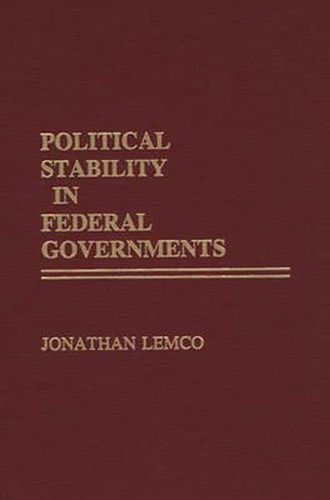Readings Newsletter
Become a Readings Member to make your shopping experience even easier.
Sign in or sign up for free!
You’re not far away from qualifying for FREE standard shipping within Australia
You’ve qualified for FREE standard shipping within Australia
The cart is loading…






Investigates those political, economic, and social conditions that theorists of federalism have associated with the stability or instability of federations. For many years, there have been pervasive arguments that federalism provides the best government possible for a nation of considerable ethnic and regional disparity. Students of federations have suggested that a centralized federal government that protects the national interest, and governments of the constituent units that protect local and regional interests, are the most responsive administrative forms for a society of great diversity. Following a review of the theoretical literature concerning federalism and political stability, data pertaining to political, social and economic conditions that are reputed to be related to federal political stability are collected and tested. These conditions include the structure of politics, the impact of political freedom, the importance of the party system and the relevance of ethnically and territorially based cleavages. The associations among economic mordernization, social mobilization, relative deprivation and federal political stability are also investigated. The author concludes with a discussion of the most significant independent variables, the prospects for future research and a focus on the extent to which federal and unitary structures can protect minority rights effectively. Lemco’s study should be of interest to political theoreticians as well as to students of contemporary nationalist movements.
$9.00 standard shipping within Australia
FREE standard shipping within Australia for orders over $100.00
Express & International shipping calculated at checkout
Investigates those political, economic, and social conditions that theorists of federalism have associated with the stability or instability of federations. For many years, there have been pervasive arguments that federalism provides the best government possible for a nation of considerable ethnic and regional disparity. Students of federations have suggested that a centralized federal government that protects the national interest, and governments of the constituent units that protect local and regional interests, are the most responsive administrative forms for a society of great diversity. Following a review of the theoretical literature concerning federalism and political stability, data pertaining to political, social and economic conditions that are reputed to be related to federal political stability are collected and tested. These conditions include the structure of politics, the impact of political freedom, the importance of the party system and the relevance of ethnically and territorially based cleavages. The associations among economic mordernization, social mobilization, relative deprivation and federal political stability are also investigated. The author concludes with a discussion of the most significant independent variables, the prospects for future research and a focus on the extent to which federal and unitary structures can protect minority rights effectively. Lemco’s study should be of interest to political theoreticians as well as to students of contemporary nationalist movements.